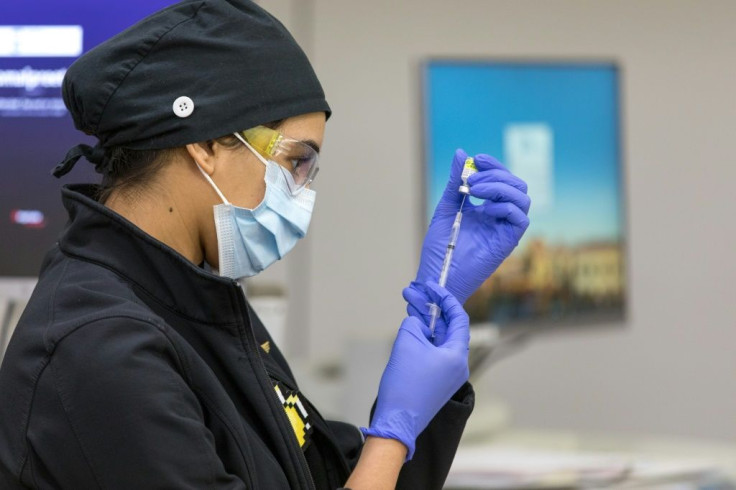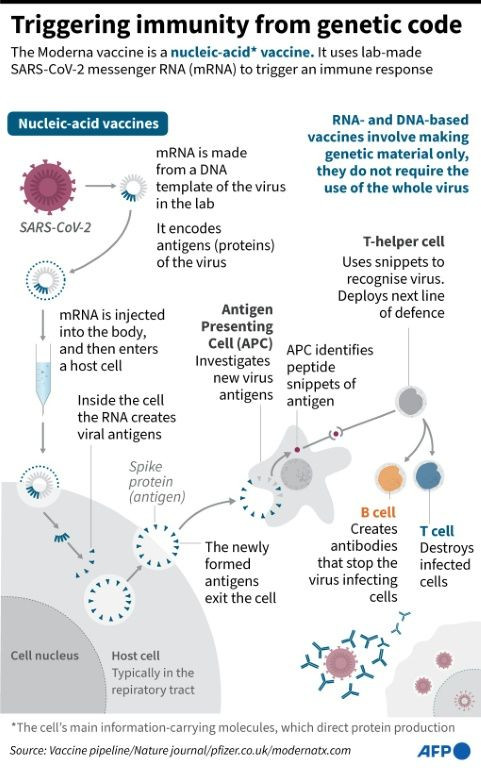US Panel Recommends Emergency Approval Of Moderna Covid Vaccine
A US panel of experts on Thursday voted to recommend emergency approval of Moderna's Covid-19 vaccine, paving the way for six million doses to start shipping as soon as this weekend.
The Food and Drug Administration is now expected to imminently grant an emergency use authorization (EUA), which would make Moderna's vaccine the second to be approved in a Western country.
The panel voted 20 in favor, none against, with one abstention.
They had been asked to answer the question: "Based on the totality of scientific evidence available, do the benefits of the Moderna COVID-19 Vaccine outweigh its risks for use in individuals 18 years of age and older?"

Epidemiologist Arnold Monto, who chaired the live-streamed discussion, said nothing should be read into the fact that the vote was even more overwhelming than last week's in favor of the Pfizer-BioNTech vaccine.
"Academics have a way of getting involved in details, and what we have done for the last eight or nine hours was to go over the details," he said.
The meeting came as the number of deaths from the coronavirus quickly approaches 310,000 in the worst-hit country in the world, which this week began vaccinating health care workers and long-term care residents with the Pfizer vaccine.
Both of these frontrunners are based on cutting-edge mRNA (messenger ribonucleic acid) technology, which had never been approved prior to the pandemic, and both are two-dose regimens.
Though the level of protection against Covid-19 for both is around 95 percent -- far greater than experts had thought was possible -- there have now been a handful of people around the world who developed significant allergic reactions after receiving the Pfizer vaccine.

The US, which has recorded more than 17 million cases of the virus, will probably become the first country to approve the Moderna vaccine.
The small Massachusetts-based biotech firm teamed up with scientists from the US National Institutes of Health on the product and has received more than $2.5 billion from the US government for its efforts.
A clinical trial of 30,400 people found it was 94.1 percent effective in preventing Covid-19 compared to a placebo, performing slightly better in younger adults compared to the elderly.

Jacqueline Miller, Moderna's vice president of infectious diseases development, said Thursday that there was a strong suggestion the vaccine also protected most people against infection, which is important from a public health perspective as it would prevent onward transmission.
An FDA review of all available data found there were "no specific safety concerns identified."
But on Thursday, FDA official Doran Fink said that should an EUA be granted, the agency would issue a beefed-up warning label regarding potential allergic reactions.
This comes after two health care workers in Alaska had such reactions to the Pfizer vaccine, and one of them was hospitalized. Two health workers in the UK also had allergic reactions.
Moderna was criticized by Stanford expert Steven Goodman because of its plans to offer the vaccine to participants in its trial who received the placebo, even before it would normally be available to their demographic group.
This would deprive the trial of a control group and reduce the quality of data that could be gleaned from it, plus set a bad precedent for future trials, he said.
But Tal Zaks, Moderna's chief medical officer, defended the proposal.
"None of our trial participants would be 'jumping the line' ahead of others, because we have clinical trial supplies that in fact would expire and go to waste," he said, adding many participants were at high-risk, and one person on the placebo group had died from severe Covid-19.
The most common side effects associated with the drug, called mRNA-1273, were injection site pain, fatigue, headache, muscle pain, joint pain and chills.
Few of these effects were classed as "severe."
Allergic reactions occurred in 1.5 of the vaccinated population compared to 1.1 percent of the non-vaccinated, but none were classed as severe.
To date, there have been three reports of Bell's palsy -- a facial paralysis condition, most often temporary -- in the vaccine group and one in the placebo group.
The FDA said there was insufficient information to determine that either vaccine was the cause but will continue monitoring.
© Copyright AFP 2024. All rights reserved.





















